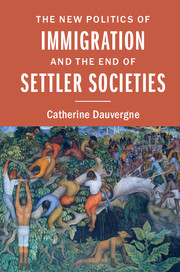Book contents
- Frontmatter
- Contents
- Acknowledgements
- Preface
- 1 Introduction
- 2 Settler societies and the immigration imagination
- PART 1 THE END OF SETTLER SOCIETIES
- PART 2 THE NEW POLITICS
- 6 Why economics and human rights are not enough
- 7 The loss of settlement and society
- 8 The close of the post-colonial
- 9 Contours and consequences of a new politics
- 10 Imagining immigration without a past – stories for the future
- Appendices
- Bibliography
- Index
10 - Imagining immigration without a past – stories for the future
from PART 2 - THE NEW POLITICS
Published online by Cambridge University Press: 05 March 2016
- Frontmatter
- Contents
- Acknowledgements
- Preface
- 1 Introduction
- 2 Settler societies and the immigration imagination
- PART 1 THE END OF SETTLER SOCIETIES
- PART 2 THE NEW POLITICS
- 6 Why economics and human rights are not enough
- 7 The loss of settlement and society
- 8 The close of the post-colonial
- 9 Contours and consequences of a new politics
- 10 Imagining immigration without a past – stories for the future
- Appendices
- Bibliography
- Index
Summary
The challenge of identifying the contours and consequences of the new politics of immigration is to use this diagnosis to say something about the future. This trajectory is typical of what we might call the narrative arc of academic non-fiction: identify the problem, at some considerable length, and then outline a solution, often frustratingly briefly. The momentum of the concluding movement impels one toward the view that there must surely be a way out of this dilemma, the possibility of a resolution.
There is almost nothing about contemporary migration politics, however, that suggests optimism. Furthermore, over the past twenty years, the reasons for pessimism have multiplied. There are millions and millions of people who want, or need, or have a right to, a better place to live. We also are beginning to understand that a considerable number of these people actually see migration as a desirable option in their lives. The prosperous Western states that set the terms for global migration regulation are more powerful than ever, and are taking ever more steps to ensure that their borders are harder and harder to cross. States of the global South are emulating them. The global population is expanding so quickly that migratory pressures mount considerably even when the percentage of people migrating shifts only slightly. The population of the global South far outstrips that of the global North, and thus population growth is centered in precisely the places that people seek to leave rather than enter. There is no moral basis to migration privilege. Prosperous states are desirable migration locations because of their histories, their economies, and their societal structures. But the right to exclude others that these states now possess arises from the power to do so. There is no way to address the biggest of migration questions with a theory of justice, because the origins of the current politics cannot be accounted for within the terms that justice demands.
Given all of this it would be fanciful and naïve to conclude with a few broad brush-stokes gesturing toward some resolution – however difficult to achieve – of a world where the politics of immigration are less mean-spirited and despondent. One conclusion from the emergence of this new politics is that things could certainly get worse.
- Type
- Chapter
- Information
- The New Politics of Immigration and the End of Settler Societies , pp. 201 - 214Publisher: Cambridge University PressPrint publication year: 2016



